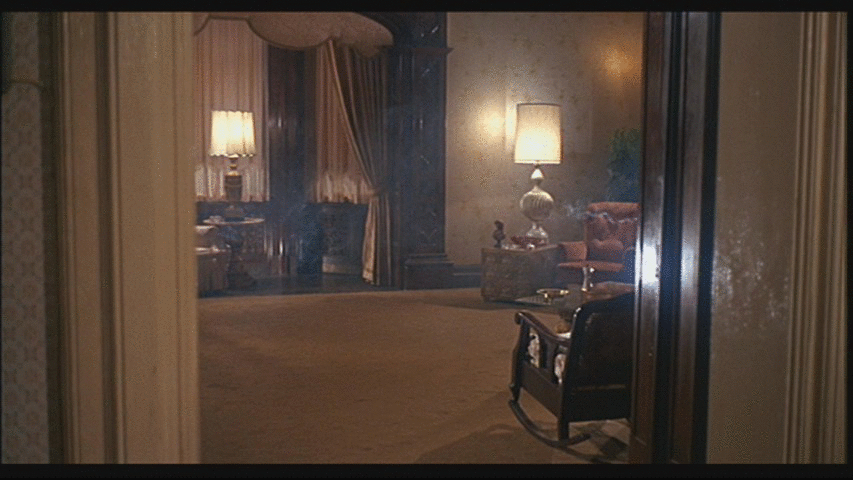 In the Oscar Horrors series we're celebrating Oscar nominated or Oscar winning achievements of or related to the Horror genre. Daily through Halloween!
In the Oscar Horrors series we're celebrating Oscar nominated or Oscar winning achievements of or related to the Horror genre. Daily through Halloween!
HERE LIES… Roman Polanski’s screenplay for Rosemary’s Baby, which he adapted from Ira Levin’s bestseller. It lost the statue for Best Adapted Screenplay to a tale of a very different plot – “There are plots against people, aren’t there?” in The Lion in Winter.
JA from MNPP here. When people ask me what my favorite movie is I tell them it’s a tie between Rosemary’s Baby and Alfred Hitchcock’s Rear Window. (I’ve always wished I could fall madly in love with another movie that starts with “R” just so I could make some lame comment about how I bide by “The 3 R’s” but it hasn’t happened yet. Yes I am a nerd.) Point being, since seeing Rosemary for the first time twenty years ago or so, I’ve managed to watch it at least once a year, sometimes more, so it’s one of those movies I know by heart.

One of my first activities upon signing up with a Twitter account was, much to my Twitter follower’s understandable exhaustion, a live tweeting of the film – I find exuberance in pretty much every line of dialogue, whether it be something small like the way Minnie (Ruth Gordon) gags out the words “THE CCCCAAARRRPPPETTT” as Roman (Sidney Blackmer) spills the vodka blush, or something big like Guy (John Cassavetes) telling Rosemary (Mia Farrow) that “ it was kinda fun, in a necrophile sorta way.” I consider the script a perfect thing, and a week (hell, a day) doesn’t go by where I don’t quote something from it.
“The name is an anagram.”
“Pain be gone, I will have no more of thee.”
“He has his father’s eyes.”
“It has a chalky undertaste.”
More on the brilliant screenplay and one of cinema's most iconic shots after the jump...
 I could go on and on and on, as my Twitter followers learned to their mounting horror. (All of them witches!) So it took me by surprise to realize only a year or two ago that I’d never bothered to read Ira Levin’s book. The amazing thing about the book and the screenplay is… they are exactly the same. That’s a bit of an exaggeration of course, there are some minor changes (there’s a little bit more about Rosemary’s Catholic family, for instance), but I don’t think I’ve ever seen a book and a screenplay so closely knit. Take this passage from the scene where Rosemary throws a very special party where you have to be under sixty to get in.
I could go on and on and on, as my Twitter followers learned to their mounting horror. (All of them witches!) So it took me by surprise to realize only a year or two ago that I’d never bothered to read Ira Levin’s book. The amazing thing about the book and the screenplay is… they are exactly the same. That’s a bit of an exaggeration of course, there are some minor changes (there’s a little bit more about Rosemary’s Catholic family, for instance), but I don’t think I’ve ever seen a book and a screenplay so closely knit. Take this passage from the scene where Rosemary throws a very special party where you have to be under sixty to get in.
Rosemary wept, black streaks smearing down her cheeks. Elise put her into a chair; Tiger took the spoons from her hands and moved the salad bowl to the far side of the table.
The door started to open and Joan ran to it and stopped and blocked it. It was Guy. “Hey, let me in,” he said.
“Sorry,” Joan said. “Girls only.”
“Let me speak to Rosemary.”
“Can’t; she’s busy.”
“Look,” he said, “I’ve got to wash glasses.”
“Use the bathroom.” She shouldered the door click-closed and leaned against it.
“Damn it, open the door,” he said outside.
I picked this excerpt totally at random, and then went and looked at it in the film to see how different it is. Wanna know what’s different?

The only thing that's different is nobody moved the salad bowl out of the way! But you can see it sitting there on the table, meaning that Polanski made sure a salad bowl was in the scene – that’s how strictly he stuck to the source. Although I sometimes doubt the reality of the myth this has turned into, the story goes that Polanski had never adapted anything at this point in his career, so when he wrote the screenplay he didn’t know he could change anything. Reading the book it certainly seems possible.
And yet he turned it into a cinematic tour de force. Take a look at another passage from Levin’s book, from Rosemary and Guy’s first dinner with the Castavets:
Rosemary looked outside the door. She could see only the end of the living room that was bridge tables and file cabinets; Guy and Mr. Castavet were at the other end. A plane of blue cigarette smoke lay motionless in the air.
From Levin’s words to one of the most iconic shots in all of cinema. The story goes that people in the audience actually leaned to try and get a better look around that corner. It perfectly encapsulates the sinister goings-on happening right out of Rosemary’s field of vision that are shaping her world. So why change it when you’ve been given such magic to work with? Perhaps that undermines the idea of “adapting” a source, but it seems to me a smart writer knows when to get out of the way of genius.
Related Post
Ruth Gordon, Best Supporting Actress
